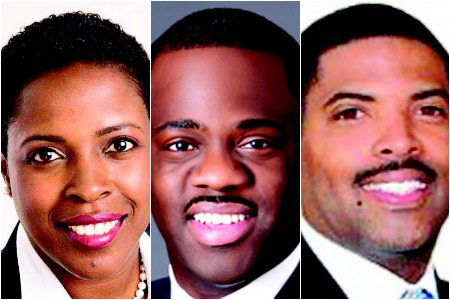
For the first time in more a 100 years Detroit will enter a new phase of political transformation and reality as voters are set to usher in council by districts in the upcoming general election. Seven out of the nine council members will be district-based and the remaining two will be at large.
The new seismic shift in Detroit’s local government came after the creation of the new City Charter following cries about the need for strong accountability and delivery of needed services by this legislative branch.
Four incumbents on the current Detroit City Council are expected to seek reelection as the remaining members have chosen to resign from the legislative body or not seek reelection.
Member Brenda Jones (District 2), James Tate (District 1), Saunteel Jenkins (At Large) and Rev. Andre Spivey (District 4) are seeking another term in a district form of government.
However, many candidates, 54 to be exact including the four members of council, are seeking to be part of the new nine-member council that is set to take office in January of 2014.
Some of the names have been prominent in Detroit political circles.
That includes Vince Keenan, the founder of Publius, the state’s first voter information website, who has been at the forefront of many conversations about preserving the integrity of the election process as well as enhancing civic participation. Keenan is running in District 6.
In District 5, Brian White, a former policy wonk for the Detroit Area Agency on Agency who was also a rigorous campaigner for the last census, working for the U.S. Census Bureau, is running in the same district as Mary Sheffield, the daughter of Rev Horace Sheffield III and also candidate Adam Hollier who was a former chief of staff to State Sen. Bert Johnson.
In District 7, John Bennett, the popular Detroit police officer who founded the political muckraking website Detroituncovered.com and an ardent advocate for police reforms and public safety, is running against former state representative Gabe Leland, the son of Wayne County Commissioner Burton Leland.
In District 3, longtime Detroit education advocate and member of the Detroit Library Commission Russ Bellant will be facing another candidate, Scott Benson, who works for Midtown Detroit Inc., as a small business advisor.
In District 2, former longtime Lansing legislator George Cushingberry Jr., has also thrown his hat into the ring for another legislative job in Detroit. Cushingberry, who has been a fixture in Lansing politics, will face off with several candidates in that district including Leslie Love a professor at Marygrove College, Ken Scott, a small business owner, and attorney Carron Pinkins.
“The charter has given the incoming council more authority, especially with the ability to confirm key department heads,” said Eric Foster, Detroit political consultant. “You have some districts that have really strong candidates that can do good work on council but you have a few other districts that are really lacking strong candidates.”
Foster said for some of those districts that don’t have competitive candidates to be really impactful “it is going to take one or two election cycles before you get the type of candidate that can really be impactful with regard to background and policy direction.”
He cited as an example District 5 where Hollier, White and Sheffield are all part of a new emerging political class in Detroit poised to make a difference.
“You have three talented young people to pick from in that particular race,” Foster said while also giving the nod to District 2 where a mix of seasoned politicos and fresh voices on the scene are going to duke it out.
But he lamented that in District 3 “outside of Scott Benson you don’t have a really deep strong field of candidates.”
He said, “With what the city is going to need out of this council, we need policy changes, not necessarily direct activism of council that is going to help citizens get services delivered and right-size the city’s budget.”
But will this new district-type government really bring about change for Detroit?
“If the right people are elected, yes, and change will come and if they fully exercise the legislative creativity that the charter gives them. They have an opportunity to really do some work,” Foster said.
E-mail bthompson@michronicle.com